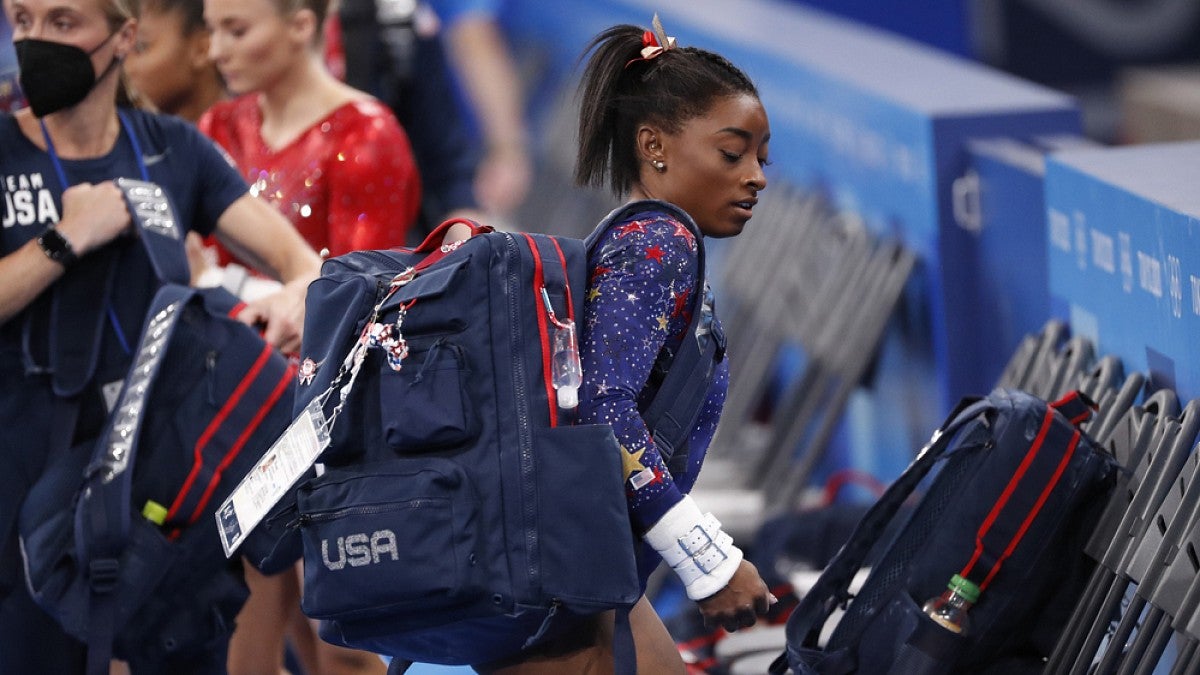Many were shocked by U.S. gymnast Simone Biles’ decision this week to withdraw from a premier event at the Tokyo Olympics to focus on mental health, a reaction that could be rooted in unrealistic expectations society places on athletes to be “superhuman,” UO experts said.
Courtney Cox, an assistant professor of Indigenous, race and ethnic studies who studies the cultural, political and economic effects of global sport, said Biles’ “courageous” move opened a door for important conversations about the relationship between athletes and an adoring public and even the pros and cons of the Games themselves.
In an emotional interview after Tuesday’s team final, Biles put the issue of mental health front and center at the Olympics.
“Whenever you get in a high-stress situation, you kind of freak out,” Biles told reporters, according to CNN. “I have to focus on my mental health and not jeopardize my health and well-being. It just sucks when you’re fighting with your own head.”
Biles was certainly under no obligation to disclose the reason for withdrawing from the individual all-around event and her decision to protect her health should be respected, said Debra Beck, assistant vice president for student services and enrollment management and executive director of University Health Services.
As an Olympic athlete, Biles is under immense pressure, Beck noted, and her move to prioritize her health over competition could be inspirational.
“Pressure can make anybody break down; we all have our breaking point,” Beck said. “I hope (Biles’ decision) shows that it’s OK if you need to take a break or choose a different course of action.”
Although sport is increasingly sensitive to athletes’ mental well-being, Cox said, some fans may have expected Biles to adopt a “gladiator” mentality and “play through the pain.” It’s a typical, albeit questionable, reaction from those who strive never to take a sick day from work and expect their favorite athletes to perform like superheroes time after time, she added.
“There is this expectation in society that athletes ‘owe us something.’ I don’t think athletes owe us anything,” Cox said. “The vulnerability Simone has given us in this moment is really great.”
Cox is a member of the steering committee for the Sport and Wellness Initiative, an academic effort that will build on the UO’s success with college sports and sport-related teaching and research to establish the university as the destination for sport and wellness in higher education.
She’s fascinated by the risks in play when athletes in different sports suffer from pressure, stress and other mental health concerns. The risk to a “slumping” hitter in baseball, she noted, is a far cry from that facing a high-flying gymnast such as Biles who experiences the disorienting “twisties” midair and could be in a life-threatening situation.
Social media, meanwhile, has created relationships in which fans feel “intimately invested” in their favorite athletes, even while being distanced from the stars’ full humanity. This can cause shock and even anger when an athlete doesn’t live up to expectations, Cox said.
The Olympics can intensify the expectations of fans and the pressure on athletes by promoting emotional narratives in which individual participants shoulder the dreams of entire countries and the Games themselves are presented as an unassailable example of the world united blissfully in competition.
Indeed, critics of the Olympics have cited the decision to hold the Tokyo Games despite the global pandemic as evidence of indifference to the health of the athletes who are participating.
—By Matt Cooper, University Communications


